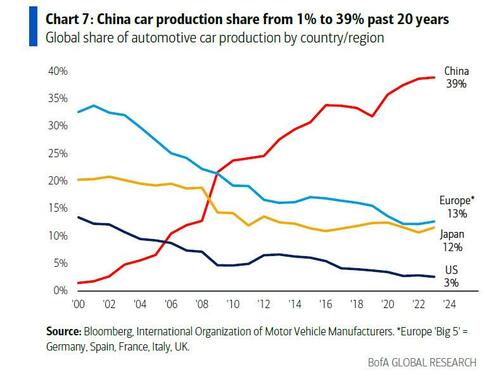„The Timing Is Absolutely Terrible”: German Government Collapses Just One Week After French Implosion
Europe is disintegrating as legacy political regimes are collapsing over across the world.
Just one week after Marine Le Pen precipitated the collapse of the French government, on Monday, Chancellor Olaf Scholz lost a confidence vote in the German Parliament on Monday, a defeat that effectively ended the increasingly unpopular government he has led since 2021 and ushered in elections early next year.
German lawmakers voted to dissolve the existing government by a vote of 394 to 207, with 116 abstaining.
The collapse of the government just nine months before elections had been scheduled was an extraordinary moment for Germany, once Europe’s powerhouse but now a laughingstock at the mercy of both China and Russia. This will be only the fourth snap election in the 75 years since the modern state was founded, and it reflected a new era of more fractious and unstable politics in a country long known for durable coalitions built on plodding consensus.
The confidence vote, in the same month that the French government fell, deepens a crisis of leadership in Europe at a time of mounting economic and security challenges. The war in Ukraine has reached a pivotal moment, with Russia set to make decisive territorial gains and perhaps even push on toward Kiev, while president-elect Donald J. Trump is set to take office in the United States. And now, Europe’s largest and second largest economies are in the hands of a caretaker governments, as the continent is sent reeling in a tailspin of chaos and revulsion to the status quo.
Scholz had little choice but to take the unusual step of calling for the confidence vote after his three-party coalition splintered in November, ending months of bitter internal squabbling and leaving him without a parliamentary majority to pass laws or a budget. And now, the political uncertainty could last for months. The elections are expected to be held on Feb. 23, but even if, as expected, his party does not finish first, Scholz would remain in place as a caretaker chancellor until weeks after that. He would step down only after a new coalition forms, which will probably not happen until April or May according to the NYT..
Seven parties will go into the campaign for Parliament with a realistic chance of gaining seats, and some on – especially on the right – are poised for very strong showings, according to polls.
The campaign is likely to be dominated by several issues that have roiled Europe in recent years. Germany and France, traditionally the two most influential countries in the European Union, are mired in debates over how best to revive their struggling economies, breach growing social divides, ease voter anxieties over immigration and buttress national defense.
Meanwhile, the establishment EU partners are looking warily toward Russia, where Putin has escalated threats about the use of nuclear weapons amid Moscow’s war against Ukraine, and where states like Germany have been providing Kiev with long-range missiles to be used deep inside Russia, in the process ensuring that relations with Moscow are abysmal for years to come.
And in typical social-democrat fashion, the leading European politicians have also been vexed by their deteriorating economic relationship with China, which has grown into a formidable competitor for many of their most important industries but has not become the booming consumer market for European products that leaders long envisioned. Instead, China has promptly become the world’s biggest producer of cars, making a mockery of what was once Germany’s most important and profitable industry, and no lies in tatters.

And they are bracing for the start of the new presidential term for Trump, who has threatened a trade war and the end of the United States’ commitment to the NATO alliance that has guaranteed Europe’s security for 75 years.
The combination of challenges has proved politically catastrophic for Europe’s legacy powers. French President Emmanuel Macron on Friday named his fourth prime minister in a year and is under mounting pressure to resign. Macron says he will stay in office and try to repair the deep fissures in his government over the 2025 budget. Scholz’s government faced similar budget challenges, along with growing concerns about how to rebuild the German military in the face of a belligerent Russia and Trump’s criticism of NATO.
As even the liberal NYT admits, it is an inopportune time for Germany to be plunged into a grueling winter election campaign and a political freeze that could last until a new government takes power.
The even more liberal Bloomberg News, made a stunning admission that „Germany’s Economy Is Unraveling Just as Europe Needs It Most”, and notes that „Germany is reaching a point of no return. Business leaders know it, the people in the country feel it, but politicians haven’t come up with answers.”
That has set Europe’s largest economy on a path of decline that threatens to become irreversible.
Following five years of stagnation, Germany’s economy is now 5% smaller than it would have been if the pre-pandemic growth trend had been maintained.
In short, Germany is heading straight for a historic economic and political collapse.
“The timing is absolutely terrible for the E.U. — basically, these multiple crises are hitting the E.U. at the worst possible time, because the bloc’s traditional engine is busy with itself,” Jana Puglierin, of the European Council on Foreign Relations, said, referring to Germany and France.
The war in Ukraine and the need to bolster Germany’s military — and what that will cost — will be among the urgent issues likely to dominate the election campaign, along with the floundering economy, failing infrastructure, immigration and the rise of the political extremes. Badly behind in the polls, Scholz is planning to highlight his caution when supplying Ukraine with weapons, especially sophisticated offensive hardware. Which, of course, is a U-turn to Germany’s legacy position which was literally the opposite, and took advantage of every opportunity to arm Zelensky and deposit more euros into his slush fund.
In any case, Scholz will have to fight hard to persuade voters to give him another chance. For now, it is Mr. Merz, a longtime figure on the political stage, who is widely expected to be the next chancellor, given his party’s strong lead in polls.
The three other mainstream parties are also led by well-known politicians, two of whom held important posts in the government: Christian Lindner, leader of the pro-business Free Democrats, whose falling out with the chancellor helped precipitate the collapse of the coalition; and Robert Habeck, the economic minister and lead candidate for the left-leaning Greens.
But in Germany’s fractious political landscape, no single party is likely to win an outright majority, leading to potentially tricky negotiations to build a coalition more functional and durable than the one that failed.
That necessity probably means that opponents cannot be criticized too heavily because they are all potential coalition partners. But it may also present mainstream parties with difficult decisions about whom they chose to work with.
All of the mainstream parties have said they would refuse to partner with the conservative Alternative for Germany, parts of which are being monitored as a threat to the Constitution by the domestic security services. Nonetheless, the party, which is known as the AfD and is ascendant in the polls with 18 percent approval, continues to gain ground.
As noted at the time, in the closely watched state elections in September, both the AfD and a newer, extreme-left party, the Sahra Wagenknecht Alliance, had their best showings ever. But mainstream parties still consider them an anathema, making it hard to form governing coalitions in those states. The results could portend equally messy coalition haggling in Berlin after a national vote, though the political fringes are less popular nationally than they are in those eastern states.
But given the likely vote tally, many political watchers predict a return of the grand coalition of the center between the conservative CDU and the progressive Social Democratic Party, which governed Germany for 12 of the past 20 years.
Tyler Durden
Mon, 12/16/2024 – 12:25

















